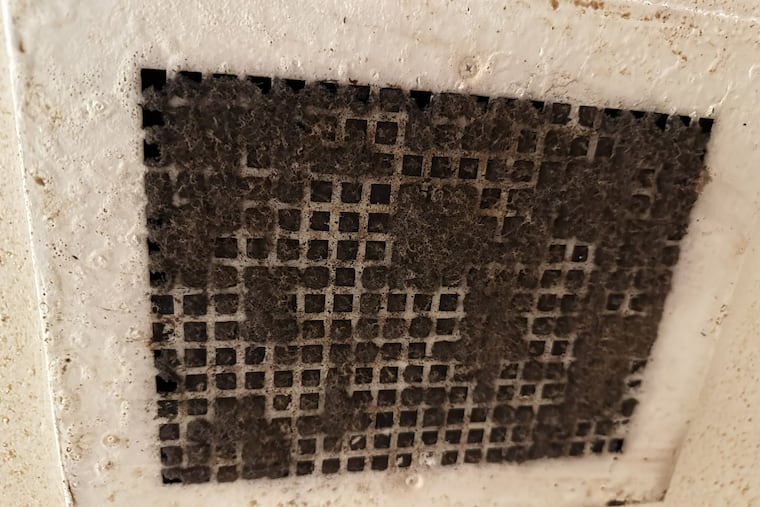Philly tenants are suing, saying their apartments are moldy, leaky, and dangerous
The Public Interest Law Center sued Columbus Property Management, a company with 34 Philly properties where many tenants use housing vouchers that is an affiliate of an affordable-housing developer.

During the summer, Marie Reese’s grandkids spend lots of time at her apartment in the Francisville section of North Philadelphia. And she loves having them.
But now, “I’m scared for them to be here,” said Reese, 52. “It’s not suitable for no one to be here.”
Reese said she’s gone without hot water for days or weeks. She has had to pluck mushrooms from around her leaking bathroom tub, and she said the surrounding floor is so weak she’s scared the tub will one day fall through. She’s been using a bucket to flush her toilet, which is difficult for her because she has multiple sclerosis and had a stroke a couple years ago.
Because of leaks and debris falling from the ceiling in her 22-year-old daughter’s bedroom, she and her daughter have been sharing her room. Reese has trouble breathing, which she said her doctors attribute to poor air quality in her home. Vents are covered in what appears to be mold.
“I thank God every day that I have a roof over my head, but I shouldn’t have to live this way because I’m in low-income housing,” said Reese, who uses a government subsidy to help her pay rent. “I’ve been through so much trauma … and nobody seems to care.”
Reese is one of nine Philadelphia tenants in three apartment complexes who are suing their property manager, the Philadelphia-based nonprofit Columbus Property Management & Development, over conditions including mold, leaks, plumbing issues, lack of heat, and elevators frequently out of service.
Columbus, which has 34 apartment complexes in the city and thousands of rental units across the Mid-Atlantic, largely serves low-income, disabled, and other vulnerable populations with housing subsidies. Its parent organization is the Philadelphia-based nonprofit Mission First Housing Group, an affordable-housing developer.
The Philadelphia nonprofit Public Interest Law Center and the Philadelphia office of international law firm Holland & Knight are representing tenants living in the Columbus properties of Freedom Village in Francisville, Powelton Heights in Powelton, and MPB School Apartments in Strawberry Mansion. The lawsuit was filed late Friday.
In a statement Monday, Tracy Joyce, senior vice president of property management for Columbus, said the company is currently reviewing the lawsuit and won’t address specifics, citing the pending litigation.
“Columbus Property Management’s priority is its residents, and we take their feedback very seriously,” Joyce said. The company “will work closely with the Public Interest Law Center and its clients to respond to their concerns. We hope this can be resolved amicably and provide a productive framework to move forward in continuing to provide suitable, affordable homes for our residents.”
Columbus’ website mentions its support services for tenants and says “an experienced and dedicated in-house maintenance crew provides routine upkeep and repairs, as well as preventative maintenance services.” Tenants have access to 24-hour emergency repair services at all properties, according to the website.
Caroline Ramsey, staff attorney at the Public Interest Law Center, said that although plaintiffs named in the lawsuit live in three of Columbus’ 34 Philadelphia apartment complexes, “we’re confident that there are other buildings [managed by Columbus] in similar condition.”
“Columbus holds itself out as supporting vulnerable people, and the reality is far different,” she said.
The legal nonprofit received its first complaint from a Columbus tenant last July. Law center attorneys said they filed their lawsuit after continuing to be unsatisfied with Columbus’ responses to complaints. They said Columbus has fixed some of tenants’ issues because of their investigations but hasn’t addressed most complaints.
Tenants say that Columbus has ignored maintenance and repair requests for months or years and that if it does fix problems, it often does so inadequately and without addressing root causes.
Why leaving is difficult
Low-income tenants face more barriers than renters as a whole when it comes to moving out of their homes. Moving can be expensive, including up-front payments landlords require. Besides the expenses associated with moving, finding an affordable new home can be challenging.
Housing vouchers that pay a portion of tenants’ rent are in short supply. In Philadelphia and nationwide, a shortage of federal funds means that many people who qualify for the assistance can’t get it. Tenants who do manage to get rent subsidies face challenges finding housing they can afford, especially if they have disabilities and need accessible homes.
» READ MORE: PHA is offering cash to try to entice landlords to accept tenants using federal housing vouchers (From 2022)
And tenants who use subsidies also encounter landlords who either choose rental applicants who can pay the entire rent themselves or blatantly say they don’t rent to voucher holders. That refusal violates Philadelphia’s law against discrimination based on source of income, and the city and housing advocates have been trying to fight the practice. Philadelphia City Council last week passed a bill that would make it easier for tenants alleging voucher discrimination to sue landlords and property managers.
Also, some housing vouchers are tied to specific properties, as is the case for some Columbus tenants. This means they would have to give up the subsidy if they left.
Tenants’ complaints
These are some of the conditions alleged by tenants in their lawsuit:
mice and roach infestations
leaking toilets
broken stoves and dishwashers
a lack of security that allows people who aren’t tenants to enter buildings and live in common areas
On behalf of the tenants, the Public Interest Law Center and Holland & Knight are requesting compensation for tenants’ out-of-pocket expenses, loss of damaged belongings, emotional distress, rent paid, and legal fees, as well as punitive damages.